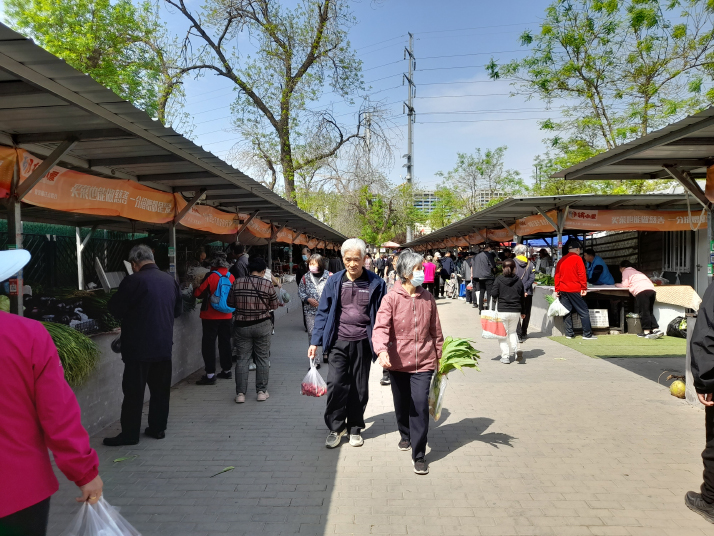| Lifestyle |
| A shopping revolution reshaping lifestyles | |
|
|
 Morning markets in China provide not only convenience for locals but also offer opportunities for senior citizens to come out, stroll around, and pass their time (MAZHAR ALAM)
In the bustling streets of China, a quiet revolution has taken place, reshaping the way people shop and interact with the market. E-commerce has emerged as a dominant force, offering a plethora of products and services at the fingertips of millions. From the smallest needle to the grandest household appliances, from humble socks to luxurious shoes, and even fresh fruits and vegetables, everything is just a click away. So, what has fueled this meteoric rise of e-commerce in China? One of the primary reasons lies in the fast-paced lifestyle of modern Chinese society. With people leading increasingly busy lives, the traditional brick-and-mortar shopping experience has become impractical. Who has the time to navigate crowded markets when a few taps on a smartphone can accomplish the same task? This shift in shopping behavior has been accelerated by the closure of some roadside shops and markets, unable to compete with the convenience offered by online platforms like e-commerce behemoth Alibaba's Taobao and Tmall, and major online retailer JD.com. But convenience alone doesn't explain the phenomenon. The allure of free shipping, even for the most trivial purchases, has captured the imagination of Chinese consumers. The mystery of how couriers manage to deliver orders at little to no cost only adds to the appeal. With shipping expenses out of the equation, online shopping becomes not just convenient but financially attractive. Moreover, the sheer abundance of choices available online is staggering. From thousands of sellers offering similar products to niche items catering to specific tastes, consumers are spoiled for choice. Besides the e-commerce giants, almost all major retailers have embraced online shopping, gradually shuttering their physical stores in favor of digital storefronts. Central to the success of e-commerce in China is the robust online payment system, led by giants like Alibaba's Alipay and tech titan Tencent's Weixin Pay. These platforms offer secure transactions and protect consumers' rights, instilling confidence in online shopping. Furthermore, the efficiency and reliability of Chinese e-commerce portals are second to none. Unlike their Western counterparts, which often leave consumers waiting days for resolution, Chinese platforms handle claims and refunds within a few minutes or hours, providing a seamless shopping experience. China's express delivery industry deserves more attention. It's remarkable how quickly online shoppers receive their products, often on the same day or within two to three days, even when shipping from other cities. Logistics service providers like SF Express, ZTO and YTO Express rush round the clock to satisfy their customers. However, amidst the convenience and efficiency of online shopping, a poignant reality emerges. The charm of traditional shopping, once a cherished ritual, is fading away. For senior citizens and retirees, a trip to the market was not just about buying groceries but also about social interaction. The opportunity to walk, meet friends and engage in idle chatter was integral to their wellbeing. Similarly, for children, the sensory experience of seeing, touching and feeling objects in real life was irreplaceable. The convenience of online shopping may be eroding these cherished moments, leading to a more sedentary lifestyle and potential health issues. As parks and walking tracks multiply, there remains a need to preserve traditional markets, especially those selling fresh produce. These markets not only promote physical activity but also offer psychological benefits, fostering a sense of community and connection that is increasingly rare in today's digitized world. In conclusion, the rise of e-commerce in China represents a paradigm shift in shopping habits, driven by convenience, choice and technological innovation. But as the country navigates this brave new world of online shopping, it must strike a balance between embracing the future and preserving the traditions that enrich its cultural fabric. Only then can it ensure progress is not achieved at the expense of human connection and vitality. BR The author is a Pakistani anthropologist living in Beijing Copyedited by Elsbeth van Paridon Comments to luyan@cicgamericas.com |
|
||||||||||||||||||||||||||||||
|
